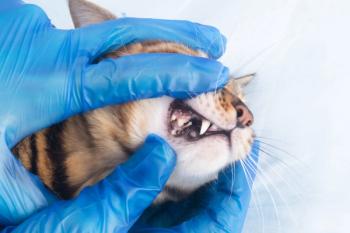
The periodontal conundrum: "Sorry doc, not doing that treatment."
What to recommend when your client does not agree with your periodontal diagnostic and treatment plan.
Susie, a 13-year-old Yorkshire terrier, sits on her owner's lap. You notice the exam room air smells like rotten eggs. The closer you get to Susie, the worse the odor.
After a brief conscious oral examination, you confirm advanced periodontal disease (see Figure). You recommend age- and condition- appropriate preanesthetic testing, figure out what it will cost to remove all or nearly all of Susie's teeth, and have your receptionist present the diagnostic and treatment plan to the owner-who declines, instead requesting dental care without anesthesia.
Susie has a 5-mm central incisor attachment loss secondary to periodontal disease. Extraction is indicated. (Photo courtesy of Dr. Jan Bellows)After much discussion, you educate Susie's owner that the procedure must be done under general anesthesia but she declines extracting all the teeth and intraoral dental radiography. How should you respond? Let Susie and her owner leave to think it over? Agree to remove only the markedly mobile teeth and those with furcation exposure? Stick to your guns, invoking a “my way or the highway” approach? Administer a long-acting antimicrobial injection and wish them good health? Such is one of the periodontal conundrums-what can you recommend that the owner will accept to help Susie?
Matching care with concern
To embrace the difference and effectiveness of optimal versus acceptable dental therapy, first we need to agree on what is not acceptable. In my opinion-and that of the American Veterinary Dental College-teeth cleaning without anesthesia, intubation; dental diagnostics without intraoral radiography (I do understand that many practices do not have intraoral radiography capabilities.); and treating oral infections with systemic antimicrobials alone are not acceptable practices. Acceptable dental therapy includes extracting those teeth affected by established periodontal disease diagnosed by clinical examination, marked mobility, significant probing depths or furcation exposure.
Fortunately, Susie did receive acceptable care after extraction of her incisors, first premolars and maxillary molars. Her caregiver agreed to daily feed her a VOHC-approved dental treat and use dental wipes daily as well as a cotton-tipped applicator at the gingival margin to help decrease plaque accumulation. We agreed to check her once monthly forever at no fee to follow her progress.
The challenge to veterinarians and staff is to understand that the patients we care for are owned by folks that have different expectations and abilities to accept optimal care. Many are new clients to the practice and have not enjoyed a long-term relationship built on trust. Practitioners need to decide for themselves what acceptable care is satisfactory and figure out a way to provide that to each patient in need.
Some recommendations
What must be provided in all dental periodontal cases:
1. A full-mouth examination under general anesthesia, including a tooth-by-tooth evaluation with a periodontal probe and full mouth intraoral radiography.
2. An optimal treatment plan based on the examination findings.
What can be provided to help the patient if the optimal plan is not accepted:
1. Extraction of those teeth that are affected by advanced periodontal disease (> 50% support loss).
2. Extraction of those teeth affected by stage 3 periodontal disease when owners will not or cannot provide daily plaque control.
Newsletter
From exam room tips to practice management insights, get trusted veterinary news delivered straight to your inbox—subscribe to dvm360.





